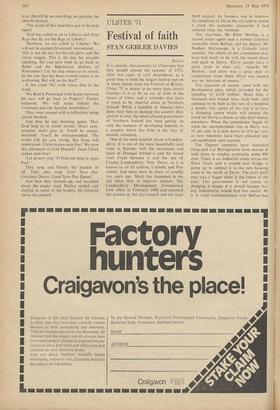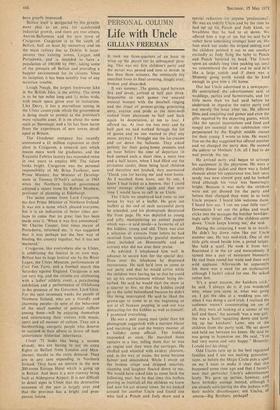ULSTER '71
Festival of faith
STAN GEBLER DAVIES
One of the most hopeful places is London- derry. It is one of the most beautifully sited cities in Europe, with the mountains and lakes of Donegal behind it and the broad river Foyle between it and the rest of County Londonderry. Now Derry, as it is known to all its citizens, Catholic and Pro- testant, had more than its share of trouble two years ago. Much has happened in the city since then to improve matters. The Londonderry Development Commission took office in February 1969 and assumed the powers of the city council and the local rural council. Its business was to improve the condition of life in the city and to rescue it from the economic stagnation it had suffered since the 'twenties.
The chairman, Mr Brian Morton, is a retired estate agent and a former Unionist councillor from Belfast, and his deputy. M Stephen McGonagle, is a Catholic trade unionist. The efforts of the commission may have had much to do with the recent peace and quiet in Derry. 'Derry people have a great pride in their city.' remarks Mr Morton, 'and there was a great deal of cooperation from them. What was needed was an injection of money.'
The injection of money came with the development plan, which provided for the spending of £110 million. More than a thousand new homes have been built: and continue to he built at the rate of a hundred a month. The centre of the city is to have a shopping centre which will reverse the trend for Derry's citizens to take their money elsewhere. When the commission began its work the unemployment rate in Derry was 18 per cent. It is now down to 15.6 per cent as new industries have been attracted and old-established ones expand.
The Dupont company have expanded twice and Lec Refrigerators have moved in with plans to employ eventually some 400 men. There is an industrial estate across the River Foyle and a second new bridge is going up to connect it to the new housing areas to the north of Derry. The river itself may take a bigger place in the future of the area. The government is not averse to dredging it deeper if it should happen that any industrialist would find that 'useful. As it is, road communication with Belfast has been greatly improved.
Belfast itself is designated by the govern- ment plan as an area for accelerated industrial growth, and there are tv,,o others, Antrim-Ballymena and the new town of Craigavon. Craigavon is to the south of Belfast, half an hour by motorway and on the main railway line to Dublin, It incor- porates two existing towns, Lurgan and Portadown, and is intended to have a population of 100,000 by 1981, taking some of the pressure off Belfast and providing a happier environment for its citizens. Since its inception it has been notably free of any sectarian trouble.
Lough Neagh, the largest freshwater lake in the British Isles, is the setting. The town is to be ten miles long and 11 miles wide, with much space given over to recreation. Like Derry, it has a marvellous setting in the Ulster countryside which the government is doing much to protect as the province's most valuable asset. It is on about the same scale as Stevenage, and a lot has been learnt from the experiences of new towns devel- oped in Britain, The Goodyear company has recently announced a £1 million expansion to their plant in Craigavon, a research unit which means more work for graduates, and the Exquisite Fabrics factory has expanded twice in two years to employ 600. The future looks bright. Craigavon was the personal responsibility of Mr Brian Faulkner, now Prime Minister, but Minister of Develop- ment in Terence O'Neill's cabinet in 1963 when the Northern Ireland government adopted a report from Sir Robert Matthew, professor of planning at Edinburgh.
The name comes from Lord Craigavon, the first Prime Minister of Northern Ireland. It was not a name which pleased everyone, but it is an indication of better times per- haps to come that no great fuss has been made over it. 'When it was first announced,' Mr Charles Cooper, four times mayor of Portadown, informed me, 'it was suggested that it was perhaps not the best way of binding the country together, but it has not mattered.'
Craigavon, like everywhere else in Ulster, is celebrating the festival in its own way. Belfast has its huge festival site by the River Lagan, the Ulster Museum, performances of Cosi Fan Tune, and a football match this Saturday against England. Craigavon is not yet very big, and the citizens are celebrating with a ladies' athletic event, a parachuting exhibition and a performance of Oklahoma in the presence of the Governor, Lord Grey. For the next seventeen weeks the people of Northern Ireland, who are a friendly and charming people—in spite of the behaviour of the small number of political ruffians among them—will be enjoying themselves and entertaining their visitors with music, sport and all manner of culture. They are a hardworking, energetic people who deserve to succeed in their efforts to throw off their unfortunate historical inheritance.
Ulster '71 looks like being a success already. BEA are having to put on extra flights to Belfast from London and Man- chester, thanks to the extra demand. They are in any case expanding in Northern Ireland. They have an interest in the new 200-room Europa Hotel which is going up in Belfast. And there is a new runway being built at Aldergrove Airport. It is not difficult to detect signs in Ulster that the destructive nonsense of the past is largely over and that the province has a bright and pros- perous future.







































 Previous page
Previous page